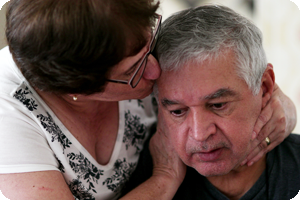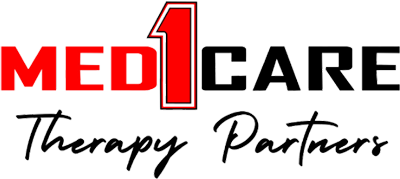 Med1Care Therapy Partner’s physical therapists are knowledgeable in the treatment of neurological disorders, which are diseases of the nervous system.
Med1Care Therapy Partner’s physical therapists are knowledgeable in the treatment of neurological disorders, which are diseases of the nervous system.
Neurological conditions may onset with trauma, disease or genetics.
Many of these conditions respond well to physical therapy, including:
- Alzheimer disease
- Aneurysms
- Bell palsy
- Carpal tunnel syndrome
- Cerebral palsy
- Encephalitis
- Guillain-Barre syndrome
- Huntington disease
- Infections such as meningitis
- Injury to the brain or spinal cord
- Multiple sclerosis (MS)
- Muscular dystrophy
- Myopathy
- Neuropathy
- Parkinson’s Disease
- Seizures
- Tumors of the brain
- Vascular disorders, such as strokes
Symptoms of neurological disorders are widespread, and a neurological rehab team often includes many skilled professionals and the active involvement of family members.
Neurological Rehab Programs
Neurological rehabilitation programs create treatment plans specific to an individual’s neurological disorder and stage of disease progression to support the highest possible physical, emotional and social outcomes.
Many neurological treatments may include:
- Assistance performing activities of daily living (ADLs), including getting dressed, bathing, using the toilet, cooking, eating, keeping house and writing
- Assistive device support and training to promote independence
- Bladder and bowel retraining
- Cognitive training to improve concentration, attention, memory, and judgment
- Community support groups
- Education and counseling
- Exercise to improve muscle strength, spasticity, pain management, and range of motion
- Mobility exercises, muscle control, muscle tone, gait (walking) and balance training
- Nutritional counseling
- Pain management
- Retraining in social and behavioral skills
- Safety measures for supporting home care
- Speech therapy to improve speaking and swallowing
- Stress management and emotional support
- Stress, anxiety and depression management
- Vocational counseling
Additional reading on physical therapy for Parkinson’s patients may be found here.
How We Can Help
The goal of neurological rehabilitation is to improve independent functioning, re-educate the neuromuscular system on movement patterns and teach the use of adaptive equipment to increase quality of life.
Med1Care Therapy Partner’s experienced therapists are trained in treating neurological disorders. Your treatment plan may include exercises that support improved balance and coordination, fine motor dexterity, gross motor training and sensory reintegration. We will work with your primary care physician, surgeon and family members to address your needs and concerns, manage your symptoms and increase your quality of life.
Call us at 419.866.0555 to schedule a consultation.
Our specialists will help you chart a course forward.
 A neurological rehab team often includes the active involvement of family members, along with several skilled professionals who help improve quality of life, including:
A neurological rehab team often includes the active involvement of family members, along with several skilled professionals who help improve quality of life, including:
- Audiologists
- Case managers
- Dietitians
- Internists
- Neurologists
- Occupational therapists
- Orthopedists
- Physiatrists
- Physical therapists (neuro physical therapy)
- Psychiatrists
- Psychologists
- Recreational therapists
- Recreational therapists
- Rehabilitation specialists
- Social workers
- Speech therapists
- Spiritual advisors
- Vocational counselors
 With no known cure for Parkinson’s disease, physical therapy treatment aims to compensate for changes in the brain and body with movement techniques, equipment and muscle strengthening and loosening.
With no known cure for Parkinson’s disease, physical therapy treatment aims to compensate for changes in the brain and body with movement techniques, equipment and muscle strengthening and loosening.
Physical therapy supports Parkinson’s patients with:
- Balance and gait training
- Exercises to decrease spasticity, joint contracture and joint inflammation
- Exercises to increase muscle strength and coordination
- Hot and cold treatments to reduce stiffness and pain (diathermy heat treatments are NOT safe for patients with deep brain stimulators)
- Physical and occupational therapy
 According to the Mayo Clinic, there’s good evidence that diet changes can reduce dementia and cognitive decline, slowing brain aging by almost eight years and decreasing the risk of Alzheimer’s onset.
According to the Mayo Clinic, there’s good evidence that diet changes can reduce dementia and cognitive decline, slowing brain aging by almost eight years and decreasing the risk of Alzheimer’s onset.
Read more about the MIND diet here.
